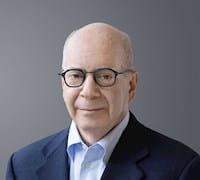The Class: Perspectives on Capitalism
Robert H. Gertner is the Joel F. Gemunder Professor of Strategy and Finance and the John Edwardson Faculty Director of the Rustandy Center for Social Sector Innovation.
The Background
A lot of students seem to have views about capitalism that are surface level or inconsistent. For example, some people call themselves socialists when they’re really not socialists. There’s been this movement of sorts that says capitalism is broken and that the solution is for companies to voluntarily decide to behave better. Here at Booth, we’re graduating future leaders—in particular, business leaders. I felt that they should understand some of these issues and trade-offs in a deeper way.
The history of the University of Chicago also plays into the story. The school has had a real focus on “small l” liberalism and free markets, and our faculty here have had a variety of nuanced views on the topic. It felt like we should be doing more in this space. I said to myself, it would be really great if we had a course about capitalism. Then I thought, but who’s going to teach that course?
Some colleagues that are indeed qualified were off teaching other things. And what’s special about this place is that so many people have so many different views and perspectives. So I thought, what if we structured the course differently? Rather than a single faculty member, what if we provided perspectives on capitalism? That was the genesis. I got excited about the idea, and we ended up with a structure that’s highly unusual. Now the course is a year old. We offered it for the first time last spring, and will offer it again in Spring Quarter 2023.
The Approach
The course is structured with guest lectures followed by sessions of small sections of students discussing weekly readings among themselves and with a faculty member.
Last year, we had several economists, one historian, and one philosopher as guest lecturers. The perspectives among the economists were right wing and left wing. I asked people to speak about their research and the way it informs their perspectives on capitalism.
Lecturers included Ken Pomeranz, a historian who studies China and whose work explores why the Industrial Revolution happened in Europe rather than in China; Michael Greenstone and Michael Kremer from the economics department; Booth economists Richard H. Thaler and Marianne Bertrand; Agnes Callard from the philosophy department; and Booth finance professor Raghuram G. Rajan. A similar roster is anticipated for this year.
The goal is to push students’ thinking. It’s meant to be a class where we ask students to read a lot—historical readings, academic readings, theoretical and empirical ones, as well as journalism from the Economist and the New York Times. We’re asking students to read, to think hard, to understand the historical and intellectual contexts for the set of debates around free markets and socialism, and the application—what’s the role of business in society, how did it evolve to what it is, and what should it be?

“What’s special about this place is that so many people have so many different views and perspectives."
— Robert H. Gertner
The Discussion
Before class started, we gave students a 40-question survey on their attitudes about capitalism and about policy issues such as vouchers for public schools. We asked if students thought of themselves as more of a socialist or a capitalist, and whether they thought companies should act responsibly beyond their legal obligations.
There were, really, two first days of class: an opening lecture and then the initial meeting of individual sections. Booth professor Kevin M. Murphy, a brilliant economist and great presenter, spoke to the class for the opening lecture.
Then, for the first day of my section, I went around the room and asked the 12 students to give longer introductions than usual that shared the unique perspective they could provide to the class. We had students who grew up in different parts of the world, in immigrant families, in families from a variety of work backgrounds.
At this point in the discussion, we generally talked about the readings. But on this opening day, I first presented our survey results and asked them to react.
In general, students had more negative attitudes toward capitalism at the start of the course than one might have anticipated. A lot of differences in students’ points of view on capitalism were actually differences in their views about government and the role of government. Most of the students were disillusioned with the governments they see, including but not exclusively the US government. That pushed some to want less government intervention and others to want better intervention.
At the end of the quarter, we redid the survey to see how peoples’ attitudes had changed. Their views were now overall more consistent with a Nordic country approach to how to organize society—that is, an appreciation for the benefits and power of free markets, but an inclination toward a fairly interventionist government in education and health care. They also had nuanced views on things like regulation.

The Classwork
Classwork was mostly doing the readings in preparation for discussion, but we also had several short writing assignments. We asked students to write two op-ed-like pieces on any topic from the course. We also had them write one- or two-paragraph reactions to the guest lecture each week.
In addition, we had groups of two or three do a country study. They researched the institutions in a country they were interested in, gave short presentations, and led discussions.
For this year, we may keep the country studies, but move to one op-ed and have students write their weekly reactions to the readings that they then submit ahead of class to help inform the discussion.
Last year, during the final week of class, we did a series of debates, but they took a lot of time, so we’re going to drop them this year. I’ve been toying with the idea of having students write something based on NPR’s This I Believe series. Students would write a one-page essay describing their worldview about the issues we covered in the class, and then we would all discuss them.
The Takeaway
One student said they came away with a new appreciation for reading. It wasn’t really an intention, but that’s also part of it. It’s great if students leave the course feeling comfortable having deep discussions and debates with their peers around a set of important issues.
I hope students leave the class with a bigger historical and intellectual perspective on capitalism, as well as broader and deeper views around whatever the issues of the day are. That they think about the role of companies wherever they find themselves, and that they consider the current controversies in a deeper and more nuanced way. That’s the most important thing.
From the Students
Trillia Fidei-Bagwell, ’22, Global Gas Director at Energy Transition Fund
One of the reasons I came to Booth was to better understand the systems we live in in order to change them. I work in the social sector and am focused on tackling the climate crisis and accelerating a just and equitable energy transition, so interrogating capitalism has always been a major interest. This class was everything I was looking for in terms of understanding the underlying frameworks that shape most of society and business today.
One of my biggest takeaways was the importance of political and social institutions to capitalism in a democratic society. Governments and society create the underlying conditions that markets and companies need to thrive, such as security, justice, an educated workforce, or clean air and water. But they also serve as a crucial counterbalance to capitalism’s tendency to drive inequality and concentration of power, by ensuring equality, well-being, and community.
This course gave me a big-picture understanding of how markets, governments, and society fit together, where market dominance has gone too far, and what the entry points might be to enact a different vision of the future.
Kurt Kargou, ’22, Growth Portfolio Manager at REDF
Milton Friedman’s views on free market capitalism are synonymous with the University of Chicago. As a student at Chicago Booth who does not share all of Friedman’s views on capitalism and the underlying assumptions he makes in his arguments about free market capitalism and the role of business leaders, I wanted to gain a deeper understanding of capitalism from different perspectives.
The reading, lectures, and group discussions expanded my understanding of capitalism and provided me with tools and perspectives that have helped me engage thoughtfully in my role working to fund social enterprises. Learning about how the tools of capitalism can be used in the grantmaking and impact sector to drive results was one of the reasons I came to business school and one of the main reasons I wanted to take the course, so this was memorable.
Professor Rajan’s lecture about inclusive localism and reviving disadvantaged communities is always in the back of my head when we discuss the structure of loans, grants, and capacity-building support for organizations we fund.
Kenny Bourgon, Current Evening MBA Student, Product Manager at PayPal
The list of brilliant speakers is what inspired me to enroll, but the real value of the course comes from the readings. Professor Gertner has curated the seminal texts on capitalism, each of which complicates and adds nuance to the story of capitalism.
The unexpected joy of this class is the seminar, where 12 students and our professor break down the readings and analyze our own perspectives. The sessions were thought provoking and vulnerable and challenged my personal philosophy. I would call my friends and family on the walk home to continue the conversation and reflect on what I had learned.
This class left me with fewer convictions about the inherent goodness or badness of capitalism. It did give me an informed, but flexible, view of society and my place in it.


